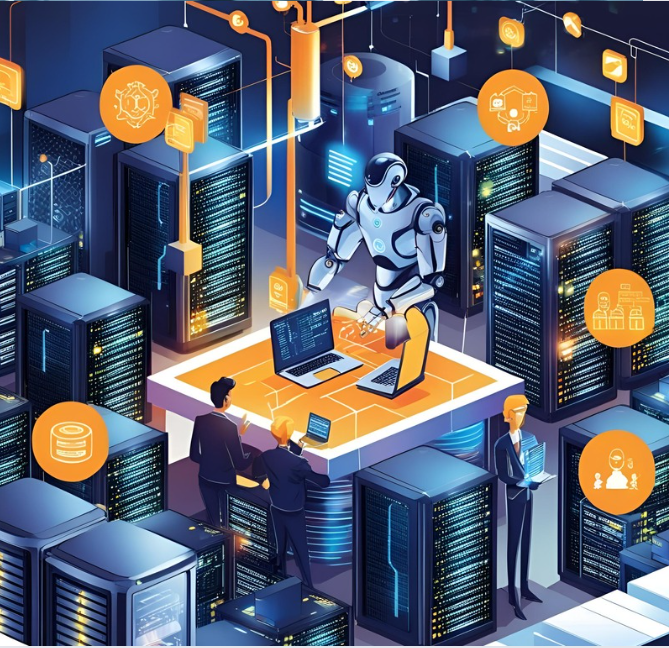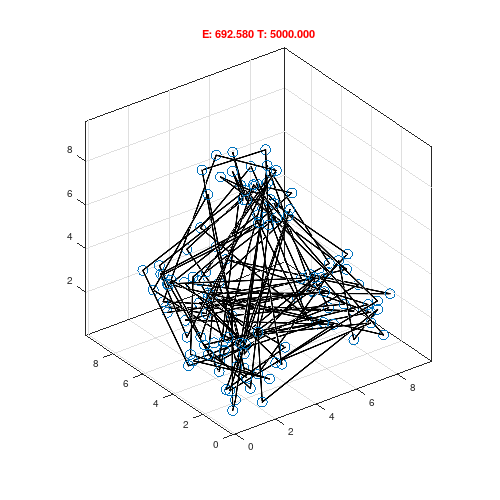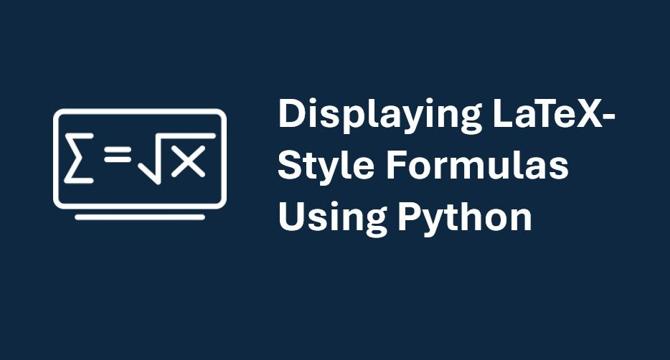Data Science News
Medium
363

Image Credit: Medium
The Mirage of “Plug-and-Play” AI
- Many enterprises face challenges with AI integration due to the complex and outdated systems they operate.
- Efficient integration of AI requires a strong API infrastructure to enable seamless communication between various systems.
- Investing in generative AI can yield significant returns, but successful implementation depends on overcoming integration hurdles.
- Prioritizing API development and integration work is crucial for maximizing the potential of AI applications and improving customer experience.
Read Full Article
21 Likes
Analyticsindiamag
350

Image Credit: Analyticsindiamag
OpenAI Wants to be a ‘24/7 World-Class Doctor’ in Your Pocket
- OpenAI has introduced HealthBench, a benchmark for AI systems in healthcare to enhance patient and clinician support in health discussions.
- The benchmark covers seven areas like emergency care and global health, aiming for continuous improvement in AI capabilities.
- With input from 262 physicians, HealthBench includes 5,000 health-related conversations for testing model responses in medical conversations.
- OpenAI's models have shown progress in healthcare tasks, with newer versions like o3 outperforming predecessors in tests.
- ChatGPT has been praised for assisting users in understanding health issues and providing diagnoses, even outperforming human doctors in some cases.
- Despite AI advancements in healthcare, experts like Dr. CN Manjunath emphasize the importance of physical examination for accurate diagnosis.
- OpenAI's interest in healthcare is evident from job openings for roles like health AI research engineer, aligning with its focus on AI applications in healthcare.
- Google has also made strides in healthcare AI with projects like TxGemma and Med-Gemini, aimed at supporting therapeutic development and clinical decision-making.
- Anthropic and Google's initiatives highlight the increasing application of AI in healthcare, promising advancements in disease treatment and scientific research.
- AI holds the potential to extend human life by enhancing access to care and supporting medical research, as per insights from industry experts.
Read Full Article
21 Likes
Analyticsindiamag
238

Image Credit: Analyticsindiamag
Why Claude is Losing Users
- Users of Anthropic’s Claude have been expressing growing frustration on the ClaudeAI subreddit due to persistent issues with the service.
- Users reported feeling limited by the Pro plan, leading to cancellations as free tools like Google’s Gemini Studio outperformed Claude.
- Developers extensively using Claude confirm hitting rate limits, with reports of increased limitations impacting productivity and user experience.
- While some users are hopeful for Claude's recovery citing its analytical reasoning prowess, the platform continues to face criticism and a loss in users.
Read Full Article
14 Likes
Analyticsindiamag
8

Image Credit: Analyticsindiamag
US’ AI Chips To Be More Accessible to Saudi Arabia: Report
- The U.S. government is preparing to announce a deal with Saudi Arabia to provide more access to advanced semiconductors for the latter, including chips from companies like NVIDIA and AMD.
- Saudi Arabia's access to these chips is aimed at boosting its artificial intelligence ecosystem, with the launch of an AI venture supported by the $940 billion Public Investment Fund.
- There are concerns about potential access to these chips by China, leading to restrictions imposed by both the Trump administration and Biden's 'Framework for Artificial Intelligence Diffusion.'
- Plans to simplify export control rules for AI chips may be announced soon to promote American innovation and dominance in AI technology.
Read Full Article
Like
Analyticsindiamag
398

Image Credit: Analyticsindiamag
Infosys Partners with LTA to Bring AI-led Tennis Data Analysis
- Infosys partners with LTA for a three-year technology agreement to support the HSBC Championships at Queen’s Club, London.
- Infosys becomes the official AI and Innovation Partner for the event, focusing on using AI for player performance analysis, enhancing fan experience, and improving tournament operations.
- Infosys will utilize its AI technology, Infosys Topaz, for real-time match insights, interactive fan features, sustainability initiatives, and community engagement through digital tools.
- Infosys aims to elevate player and fan experience at the Queen’s Club tournament by leveraging Infosys Topaz, their suite of AI-first technologies.
Read Full Article
23 Likes
Medium
285

Why Outliers Are a Major Headache in Data Analysis
- Outliers, known as non-robust estimators, can significantly impact data analysis by skewing averages and leading to incorrect conclusions.
- Outliers inflate variance and confidence intervals, causing models to perceive data as more variable than it actually is, resulting in flawed forecasts and testing outcomes.
- Outliers can violate model assumptions such as normality and equal variance, leading to biased parameter estimates and misleading feature importance.
- Outliers hide true patterns in data, obscuring trends, seasonality, and periodicity, making it challenging to identify meaningful insights.
Read Full Article
17 Likes
UX Design
25
Image Credit: UX Design
How Runna turned the London Marathon into a content loop
- Runna recently turned the London Marathon into a content loop, showcasing their strategies for creating shareable product moments.
- A unique recap of the 2025 London Marathon was shared by Runna, focusing on statistics such as year-on-year average finish times, gender splits, percentage of people achieving personal bests, and the most popular running shoes (Asics).
- This recap was found to be insightful and engaging by viewers, providing a fresh perspective on the event.
- Runna, acquired by Strava, demonstrated how to effectively leverage content to drive user engagement and create memorable experiences.
Read Full Article
1 Like
Analyticsindiamag
203

Image Credit: Analyticsindiamag
How Zeiss is turning its India GCC into Data Custodians
- As artificial intelligence (AI) advances, the role of data within organisations has become more strategic.
- Global Capability Centers (GCCs) are helping govern and transform data resources.
- ZEISS Group India is transitioning into a data-driven organization with a unified data landscape.
- India is recognized as a key talent pool for ZEISS to scale operations.
- Other players like Walmart Global Tech India and Citi's Global Services Center are also driving data consolidation.
- ZEISS India is building an enterprise data platform hosting 80% of global data in a cloud environment.
- ZEISS developed ZEISS GPT, a secure AI solution, ensuring data stays within the company's ecosystem.
- The company is piloting AI solutions like GPT+ and Microsoft Copilot for various use cases.
- ZEISS is investing in data culture development, training, and hiring skilled professionals.
- ZEISS is establishing a modern manufacturing facility in Devanahalli, Bengaluru, focusing on intelligent automation.
Read Full Article
12 Likes
Analyticsindiamag
355

Image Credit: Analyticsindiamag
Indian-Made Drones are Watching the Line of Control from the Sky
- Private drone startups in India, such as ideaForge, Garuda Aerospace, and others, have become vital to the country's defence strategy.
- These companies are shifting focus from civilian applications to military use, responding to growing demand for advanced aerial capabilities.
- Various startups are developing cutting-edge drone technologies like swarming drones and AI-powered surveillance platforms for defence purposes.
- The surge in demand for drones from the defence sector, prompted by recent operations, has led to companies like Scandron scaling up production rapidly.
- Indian drone firms are investing heavily in R&D and obtaining certifications for defence use, striving for high indigenous capability in their products.
- The rapid militarization in India through drone deployment signals a shift in innovation, sovereignty, and supply chains in the defence industry.
- These developments are prompting a broader shift towards tactical drones with distributed capabilities in the Indian defence sector.
- Accountability concerns arise as drone technologies become more precise and potentially lethal, even though current models are not armed.
- Indian drone startups emphasize the need for sustained demand and a robust domestic supply chain to ensure long-term growth and transformation of the sector.
- With regulatory frameworks to establish and ethical considerations to navigate, India's drone startups are navigating uncharted territory in the defence industry.
Read Full Article
21 Likes
Analyticsindiamag
38

Image Credit: Analyticsindiamag
Phonepe Faces UPI Outages After Disaster Recovery Drill Overloads New Data Centre
- PhonePe faced a significant UPI outage on Monday around 7:30 PM due to network capacity shortfall at the newly deployed data centre during disaster recovery drills.
- All traffic was routed through the new data centre as part of heightened cybersecurity measures, leading to infrastructure failure under high transaction volume.
- Rahul Chari, the co-founder and CTO of PhonePe, cited the escalation of conflict as the reason behind the active disaster recovery drills that caused the outage.
- Vijay Shekhar Sharma, Founder of Paytm, confirmed smooth UPI operations on the Paytm platform amidst PhonePe's outage issues.
Read Full Article
2 Likes
Hackernoon
103

Image Credit: Hackernoon
The 10 Weirdest, Most Brilliant Algorithms Ever Devised and What They Actually Do
- The Marching Cubes algorithm, invented in 1987, helps in extracting a polygonal mesh from a 3D discrete scalar field, enabling the creation of 3D models from medical scans.
- Wave Function Collapse algorithm, inspired by the double-slit experiment, is used to procedurally generate infinite maps for video games, providing randomness with a purpose.
- The Diffusion Model, based on thermodynamics, is used in AI to refine noise into meaningful images like DALL·E and Stable Diffusion, revolutionizing image generation.
- Simulated Annealing algorithm, inspired by metallurgy, optimizes solutions by balancing exploration and exploitation, a metaphor for learning to code.
- Sleep Sort algorithm, which uses thread sleeping times for sorting, showcases a clever yet impractical sorting approach.
- BOGO Sort humorously relies on random shuffling for sorting, with a fictional concept of Quantum BogoSort leveraging parallel universes for instant sorting.
- BOID algorithm simulates bird flocking behaviors with three simple rules, demonstrating nature-inspired decentralized coordination through minimal code.
- SHOR’s Algorithm, utilizing quantum mechanics concepts like qubits, superposition, and entanglement, aims to revolutionize integer factorization for cryptographic applications.
- Marching Cubes algorithm transforms 3D scalar fields into visual surfaces, revolutionizing medical imaging by creating 3D models from CT or MRI scans.
- Practical Byzantine Fault Tolerance algorithm ensures consensus in distributed systems, crucial for blockchain and cloud databases to maintain trustworthiness.
- Boyer-Moore string search algorithm, used in tools like grep, efficiently searches patterns by scanning text from right to left using heuristics, showcasing the power of unconventional ideas in algorithms.
Read Full Article
6 Likes
Analyticsindiamag
229

Image Credit: Analyticsindiamag
Ray-Ban Meta Glasses with AI Features Now Available for Pre-order in India
- Ray-Ban Meta glasses are available for pre-order in India starting at ₹29,900, offering voice-enabled features and hands-free communication.
- The glasses integrate Meta AI, allowing users to interact via voice commands like asking questions, streaming music, taking calls, and going live on Instagram or Facebook by saying 'Hey Meta.'
- Key features include live translation support for English, French, Italian, and Spanish, along with the ability to work offline when language packs are downloaded in advance.
- The glasses come in classic Wayfarer style in two sizes and a new Skyler frame in Shiny Chalky Grey, with options for sun, clear, polarised, or Transitions® lenses, and prescription lens compatibility.
Read Full Article
13 Likes
Analyticsindiamag
39

Image Credit: Analyticsindiamag
15 Best Presentations On Artificial Intelligence And Machine Learning in 2025
- The SlideShare platform offers concise and informative recaps on various topics, including Artificial Intelligence and Machine Learning.
- Popular presentations focus on AI basics, chatbots, AI in law, AI's future, and more.
- Topics range from simple AI introductions to deep dives into AI applications and ethics.
- Insights into AI adoption in Asia, machine learning lessons, and design ethics for AI are also highlighted.
- The presentations cover a wide array of AI-related subjects and provide valuable information for both beginners and experts.
- Key themes include the impact of AI on different sectors, the future of work, and the integration of AI technologies.
- Overall, these presentations offer a comprehensive view of AI and Machine Learning trends in 2025.
- From historical perspectives to future considerations, the presentations touch on various aspects of AI development.
- They also address concerns like job displacement, ethical AI design, and the evolving landscape of AI technologies.
- The presentations serve as valuable resources for understanding and staying updated on the latest in AI and ML advancements.
Read Full Article
2 Likes
Analyticsindiamag
411

Image Credit: Analyticsindiamag
Why Developers are Quietly Quitting Golang
- Developers like Yash Batra and Ian Lance Taylor are expressing dissatisfaction with Golang, citing productivity issues and evolving programming environments.
- Batra's blog post 'I Picked Golang for My Startup—Biggest Mistake of My Life' highlights the challenges faced while using Go for startups.
- Go, once praised for simplicity and concurrency, is now being reconsidered as a prototyping language, with developers moving towards Kotlin, Rust, and Zig for more flexibility and modern features.
- Critics mention limitations of Go, including verbose error handling, issues with asynchronous programming, and difficulty in finding experienced Go developers.
- Zig offers clean syntax and blazing performance, Kotlin's rich ecosystem aids in onboarding and iteration, while Rust excels in performance and safety.
- Despite criticisms, Go still thrives in infrastructure and systems engineering, being preferred for cloud-native tools and internal tooling at large organizations.
- Go's simplicity is both a strength and a limitation, with some developers finding it more suitable for reliability rather than rapid product iteration.
- As the programming environment evolves, languages like Go must adapt to meet changing needs, as highlighted by Ian Lance Taylor's departure from Google.
- While Go remains popular in certain niches, the criticism and developer migration towards other languages indicate a shift in the programming landscape.
- The evolving preferences in the developer community suggest that languages like Kotlin, Rust, and Zig are gaining traction for their features and performance advantages.
- Despite the challenges faced by Go, it continues to have a dedicated fanbase and persists as a prominent language within specific domains.
Read Full Article
24 Likes
Medium
13

Image Credit: Medium
Displaying LaTeX-Style Formulas Using Python
- Python libraries can be used to format equations like LaTeX for clean math formatting.
- Matplotlib supports LaTeX-style math using a simplified math expression parser.
- SymPy is Python's symbolic mathematics library that allows formatting and pretty-printing formulas using ASCII, Unicode, or LaTeX.
- Manim is a math animation engine for creating professional and presentation-ready math animations.
Read Full Article
Like
For uninterrupted reading, download the app